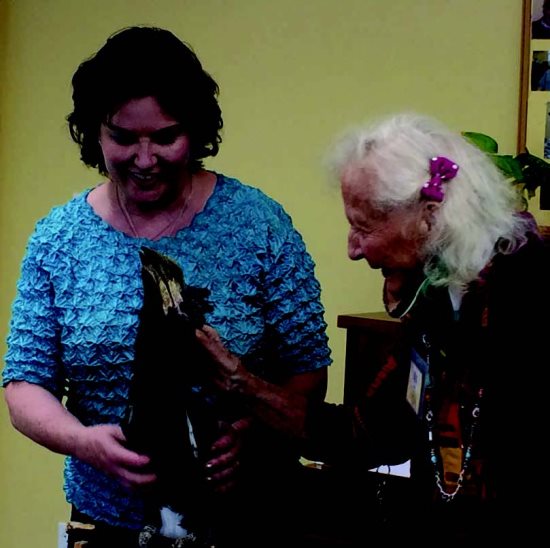
| ||||||
Gleason is the marketing director at Aegis of Moraga during the day, but at night and on weekends she is the guardian and protector of more than 20 birds from all over the world. She has transformed her garden into a giant aviary where her friends lead their lives, unrestrained and intact as their wings are not clipped. Josephine Bonaparte, the hornbill, like the other birds, can also access the house and fly freely there. Josephine is extra special because she sleeps in Gleason's closet that was transformed into a nesting place, and even sometimes comes to nap with Gleason in bed.
The director came for a visit at LARC to provide an activity that would engage the group of challenged adults' interest. They listened to her many stories, how Gleason had acquired the now 24-year-old bird, born to a breeder, like all her other birds, 14 years ago, and marveled at its beauty and gentleness. They enjoyed seeing the bird being fed fruits, asking for it with a gentle movement. Some came to the perch and petted her without any fear.
Beth Montgomery, who is LARC's director, was also there, as she is almost every day that the nonprofit she leads is in operation. She explains that the center is privately funded and was created 20 years ago to provide a warm and caring environment to memory-impaired adults while providing some respite to their caregivers. She adds that the Orinda center is one of the last left in Contra Costa County because it is privately funded; all the other ones that were dependent on public money had to close when budgetary cuts squeezed them out of business.
Like with Gleason and her hornbill, LARC provides activities every day to its clients. The routine is predictable, there is music and singing, word games, exercise in the morning, and more games, crafts and activities in the afternoon. There are other animal activities organized, mostly with therapy dogs.
Montgomery says that the adults who come are not aware of their memory challenges and would deny having any problem. She says that LARC was renamed Lamorinda Adult Recreation Center by its clients. She notes, however, that there is now a growing number of early-onset Alzheimer patients in need of similar services who are well aware of their diagnoses.
Gleason brought several long feathers from her birds' regular molting, so the participants could take something home with them and share some of the experience with their caregivers. She redecorated her office at Aegis with pictures of all her birds when she took her job there and she often brings a bird along to stay with her while she works and for the residents to enjoy.
More information about LARC can be found at www.lamorindarespite.org. The program runs Monday through Friday from 11 a.m. to 3 p.m. and costs $70 a day.
Reach the reporter at:
